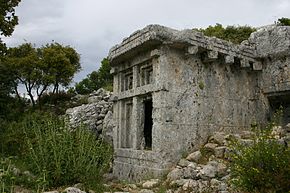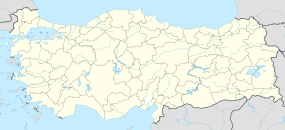Phellus
| Φέλλος Phellos |
|

One of the many ruined tombs at Phellus, situated in the Western Taurus Mountains.
|
|
| Location | Kaş, Antalya Province, Turkey |
|---|---|
| Region | Lycia |
| Coordinates | 36°24′17″N 29°48′28″E / 36.40472°N 29.80778°ECoordinates: 36°24′17″N 29°48′28″E / 36.40472°N 29.80778°E |
| Type | Settlement |
| Site notes | |
| Excavation dates | 1840 |
| Archaeologists | Sir Charles Fellows |
| Condition | Ruined |
| Public access | Yes |
Phellus (Ancient Greek: Φέλλος, Turkish: Phellos) is the name of an ancient town of Lycia, now situated on the mountainous outskirts of the small town of Kaş in the Antalya Province of Turkey. The city was first referenced as early as 7 BC by Greek geographer and philosopher Strabo in Book XII of his Geographica (which detailed settlements in the Anatolia region), alongside the port town of Antiphellus; which served as the settlement's main trade front.
Its exact location, particularly in regard to Antiphellus, was misinterpreted for many years. Strabo incorrectly designates both settlements as inland towns, closer to each other than is actually evident today. Additionally, upon its rediscovery in 1840 by Sir Charles Fellows, the settlement was located near the village of Saaret, west-northwest of Antiphellus. Verifying research into its location in ancient text proved difficult for Fellows, with illegible Greek inscriptions providing the sole written source at the site. However, Thomas Abel Brimage Spratt details in his 1847 work Travels in Lycia that validation is provided in the words of Pliny the Elder, who places Phellus north of Habessus (Antiphellus' pre-Hellenic name).
Sir Charles Fellows participated in two largely successful expeditions to Lycia, in 1838 and 1840 respectively. During which, he discovered large settlements such as Xanthos, Tlos, Pinara and Cadyanda in order to map their locations and bring back artifacts for public display in the United Kingdom (specifically The British Museum). In the process, he also came to discover six other, smaller locations, one of which being the site of what is now known as Phellus. Fellows had named all six settlements himself, without regard to thorough classical research; which inevitably altered the original names given at the time of occupation. For instance, Fellows' 'Gagae' was actually Corydala, and Phellus is initially referenced as 'Pyrrha' by the Roman Empire (in honour of the Greek myth that was detailed in Ovid's Metamorphoses) according to the works of Pliny the Elder.
...
Wikipedia

